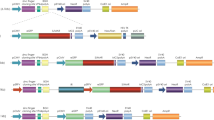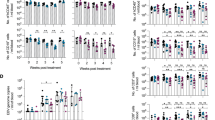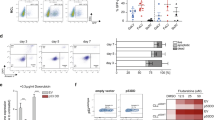Abstract
Plasmids carrying the Epstein–Barr virus (EBV) latent gene EBNA1 and the EBV latent origin of replication (oriP) stay in transfected human cells as autonomously replicating extrachromosomal genetic units. They thus might represent a suitable tool for cytokine gene introduction into human tumor cells with the prospect of therapeutic antitumor vaccination. The aim of this study was to analyze whether such plasmids permit stable and efficient expression of cytokine genes in human non-Hodgkin lymphoma cells. We tested physical stability and expression levels of plasmids carrying EBNA1 and oriP for episomal maintenance, immunoglobulin light chain enhancer elements for augmentation of expression, and cytokine or marker genes after introduction into human NHL cell lines in vitro and in vivo after inoculation into nude mice. Data obtained with these EBV-based vectors were compared with another plasmid, not carrying EBNA1 and oriP. cDNAs coding for GM-CSF, IL6, TNFα, the chloramphenicolacetyltransferase (CAT) and the β-galactosidase (lacZ) gene were transfected into the EBV-positive Burkitt’s lymphoma cell line BL60 and the EBV-negative B cell lymphoma cell line BJA-B. EBV-derived vectors permitted a high, host cell independent transfection efficiency and high and host cell independent levels of expression. After removal of the selection pressure (hygromycin B) cytokine expression could be detected for several weeks in vitro and in vivo but, however, declined continuously. These experiments suggest that episomal BC-derived vectors represent an effective tool for cytokine gene transfer in human lymphoma cells.
This is a preview of subscription content, access via your institution
Access options
Subscribe to this journal
Receive 12 print issues and online access
$259.00 per year
only $21.58 per issue
Buy this article
- Purchase on Springer Link
- Instant access to full article PDF
Prices may be subject to local taxes which are calculated during checkout
Similar content being viewed by others
Author information
Authors and Affiliations
Rights and permissions
About this article
Cite this article
Mücke, S., Polack, A., Pawlita, M. et al. Suitability of Epstein–Barr virus-based episomal vectors for expression of cytokine genes in human lymphoma cells. Gene Ther 4, 82–92 (1997). https://doi.org/10.1038/sj.gt.3300363
Received:
Accepted:
Issue Date:
DOI: https://doi.org/10.1038/sj.gt.3300363
Keywords
This article is cited by
-
A synthetic circuit for buffering gene dosage variation between individual mammalian cells
Nature Communications (2021)
-
Gene transfer into human hematopoietic progenitor cells with an episomal vector carrying an S/MAR element
Gene Therapy (2006)
-
Genetic modification of hematopoietic stem cells with nonviral systems: past progress and future prospects
Gene Therapy (2005)
-
Establishment of an oriP/EBNA1-based episomal vector transcribing human genomic β-globin in cultured murine fibroblasts
Gene Therapy (2002)



